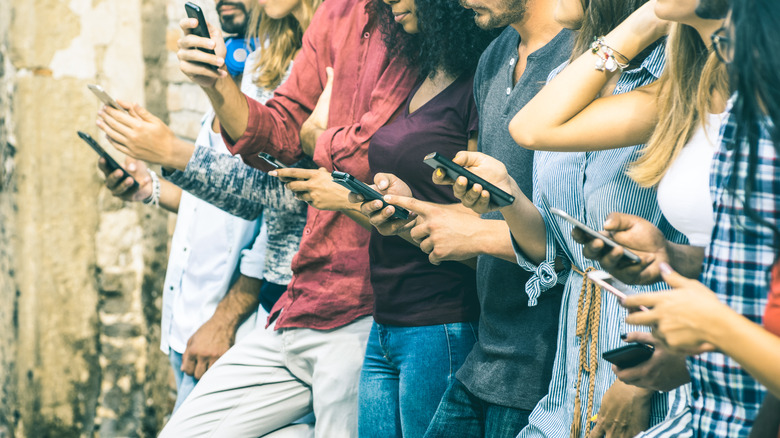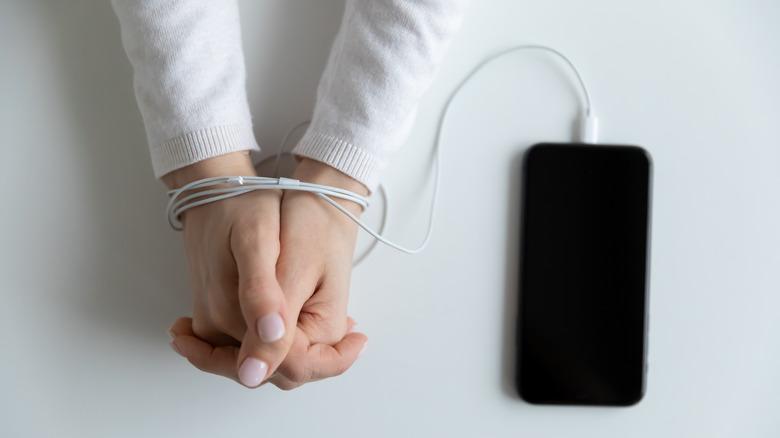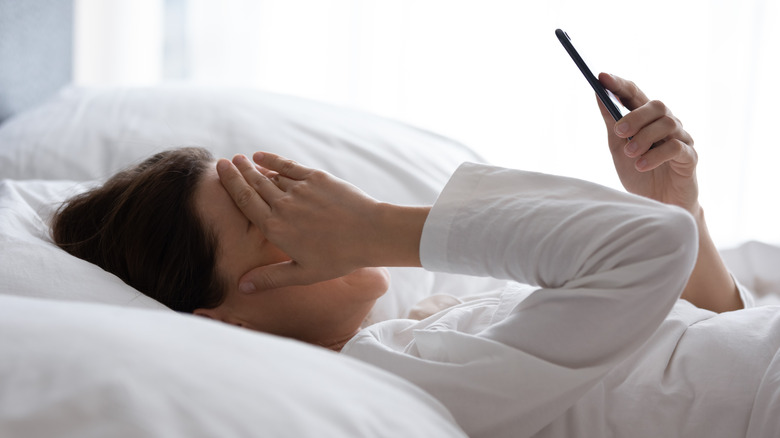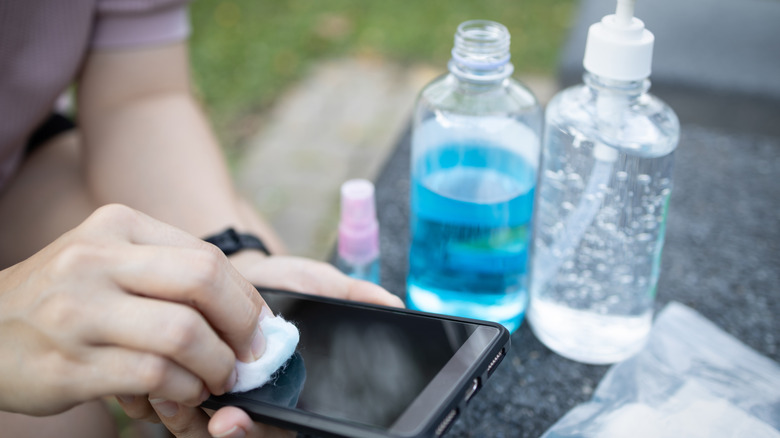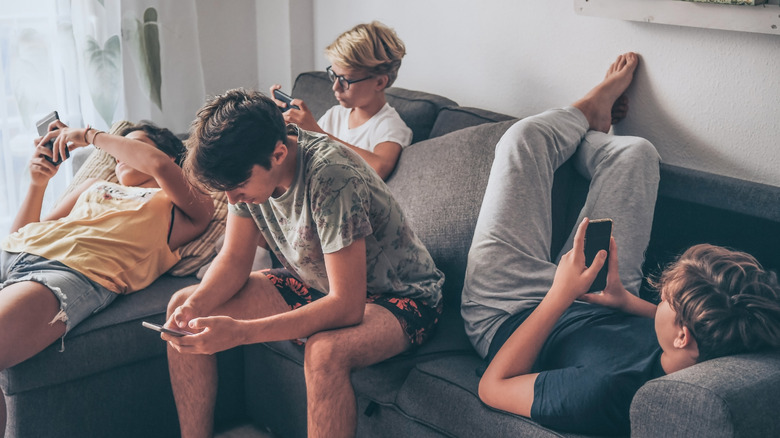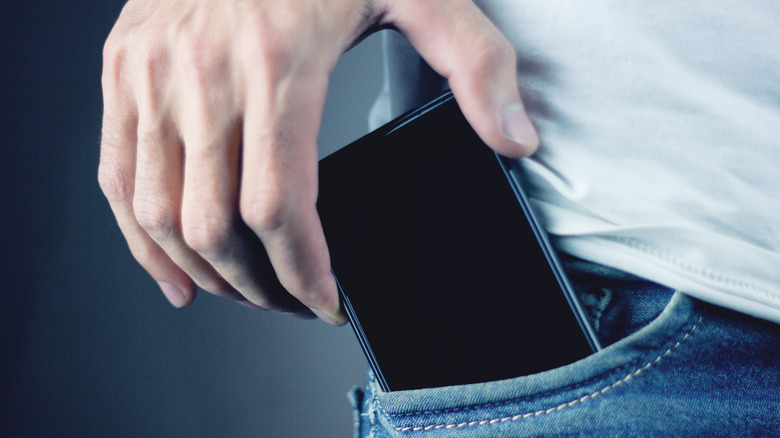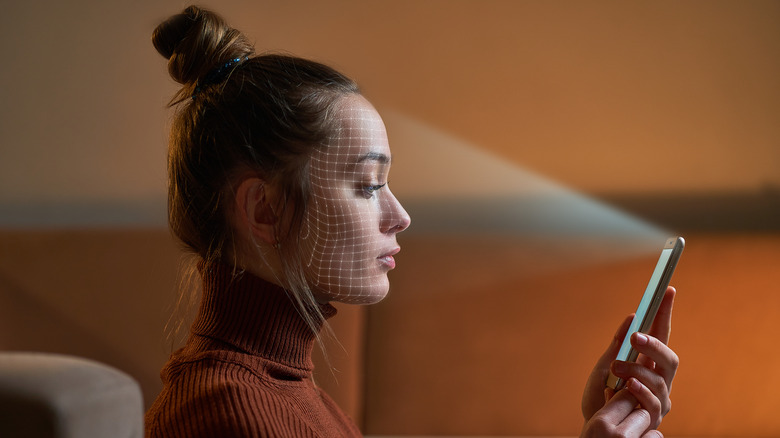Sneaky Ways Your Cell Phone Is Hurting Your Health
Born in 1973, the mobile phone is often deemed one of the greatest technological advances of the 20th century (via Wired). This ever-present device has dramatically shaped the communication landscape, as well as the way we live and navigate the world. Despite the growing cynicism toward their ubiquity, smartphones have given rise to various benefits and advantages: They help us stay connected and find our way around while providing access to a world of information at all times. Based on research conducted by Google, 75% of people believe that their cell phone allows them to be more productive, and 60% say it helps them feel more confident and prepared.
At the same time, a lot has been said about the deleterious effects of cell phones on our mental and physical wellbeing, many of which still require further study (per the International Journal of Health Sciences). Specifically, there's talk of their addictiveness, the sensory overload they create, not to mention the fact that they're intermittently giving off radiation (via Scientific American). Research appears to suggest that we weren't evolved to live this way, which has led some scientists to describe cell phone use as both a blessing and a curse — a perfect example of the "paradox of technology" (per the Journal of Behavioral Addictions). If you're looking for a good reason to take a break from your gadget, here are some sneaky ways that your mobile phone may be taking a toll on your health.
Your mind is overstimulated
Owning a smartphone has meant that we suddenly have unprecedented access to information at our fingertips. This may seem like a privilege that previous generations would have dreamed of, but some scientists argue that this convenience comes at a price (via Healthline). After all, the human brain can only take in and process a certain amount of information at any given time — no more than 60 bits per second, says research (per MIT Technology Review).
For hours on end — sometimes all day long — we're inundated with messages, emails, and notifications. Add to this the sensory bombardment of modern daily life, and the sheer assault of information can take an insidious toll on our minds, brewing up feelings of anxiety, notes Healthline. The rampant interruptions we receive from our devices are conditioning our brains to be locked in a perpetual stress or fear mode, endocrinologist Robert Lustig told Business Insider. He adds that constantly reacting to this influx of alerts creates a "stress-fear memory pathway." As a result, the prefrontal cortex — the brain's most evolved region, which is dedicated to higher-level cognitive processes — begins to malfunction and shut down.
"Having devices literally in our hands all of the time keeps us in a state of alertness that can be draining over time," Maria Mouratidis, a licensed clinical psychologist, told Healthline, adding that: "The amount and type of information is not often filtered for urgency or importance."
It's taking away your alone time
The average person spends more than three hours per day on their cell phone (via Elite Content Marketer). For many people — even those who limit their use — this nifty little gadget never leaves their side. Most of us have become so intimately and intricately fused to our digital worlds and its accompanying data network that it can be challenging to unplug without disconnecting from other areas of our lives too.
With the incessant typing, tapping, clicking, and swiping that we do, we're seldom ever truly alone. In her book "Alone Together," psychologist Sherry Turkle states that being physically alone with a smartphone doesn't constitute true psychological solitude, which is fundamentally inner-directed. Cell phone use is a type of "parasocial activity, one that is used as a distraction for people who are uncomfortable with the unstructured time of solitude," points out a 2020 research article from the American Psychological Association.
While being alone too often can have negative physical and psychosocial consequences, studies show that solitude is as important for our emotional wellbeing as socializing (via Journal for the Theory of Social Behaviour). Loneliness helps build brain structures that are connected to imagination, according to a 2020 study published in Nature Communications. People who reported being lonely had increased activity in parts of the brain involved in memory-based functions like reminiscing, future thinking, and imagining. The researchers theorized that when people are deprived of social experiences, their minds get more creative to fill the void, causing the default network in the brain to undergo changes that enhance imagination.
You're becoming less efficient
Having a smartphone has meant that we're endlessly multitasking. "We text while we're walking across the street, catch up on email while standing in a queue –- and while having lunch with friends, we surreptitiously check to see what our other friends are doing," Daniel J. Levitin, a neuroscientist and cognitive psychologist, wrote in The Guardian. This is altering our brains — and not in a good way.
Our brains are not very good at multitasking. Oscillating your attention from one task to another causes the prefrontal cortex and striatum to use up oxygenated glucose, which is the same source of energy it needs to focus on just one task, explains Levitin. This leads to exhaustion and cognitive decline. So, while it may seem as though we're being more productive by having a cell phone, dividing our attention between different activities makes us less efficient and more prone to errors. Conversely, concentrating on one thing at a time — without the looming presence of unanswered emails and messages in our periphery — enables our brains to engage the anterior cingulate and striatum, which is far less taxing and more conducive to effective work.
One of the more dangerous consequences of being distracted by cell phone is being involved in a road-related accident, per a report by the US Governors Highway Safety Association, which cites the rapid growth of smartphone use as a major source of distracted driving and pedestrian deaths.
It's shortening your attention span
Another worrisome consequence of multitasking is that it might be making you more absentminded in the long-term. A 2018 study published in the journal Psychology of Consciousness: Theory, Research, and Practice examined the relationship between smartphone multitasking and attention. The researchers found that people who used their phones regularly were more likely to carry out tasks without focusing on them, and that absentminded smartphone use corresponded with significant attention lapses including mind-wandering and making mistakes.
Research shows that people who undertake media-multitasking generally exhibit poorer "cognitive control" abilities, showed attention and memory deficits, and had smaller gray matter density in the anterior cingulate cortex — a part of the brain that plays an important role in cognitive control. Extensive cell phone use trains your brain to be "always-on, anywhere, anytime, any place" — a concept known as "continuous partial attention," coined by technology researcher Linda Stone — whereby you're scanning the world around you for stimuli but never giving anything your undivided attention.
Another study published in the Journal of the Association for Consumer Research demonstrated that even the presence of your cell phone can be damaging to your attention span. Even when people can sustain their attention and resist the temptation to look at their phones, their devices occupy mental capacity that could be used elsewhere, thereby draining the brain of its full potential and slowing down cognitive processes.
Your immune system is being compromised
Not only is your cell phone creating overwhelm, it may be throwing your immune system off-kilter. Looking at your phone first thing in the morning or last thing at night to check messages disrupts your natural cortisol rhythms, reports a 2018 study published in Computers in Human Behavior. This leads to an increase in the cortisol awakening response, which is the natural surge in cortisol secretion upon awakening in the morning. While a rise in cortisol helps kick-start your brain and energize you, elevated cortisol awakening responses underlie various health issues, as noted by research (via the International Journal of Psychophysiology).
"Your cortisol levels are elevated when your phone is in sight or nearby, or when you hear it or even think you hear it," David Greenfield, professor of clinical psychiatry at the University of Connecticut School of Medicine, told The New York Times. "It's a stress response, and it feels unpleasant, and the body's natural response is to want to check the phone to make the stress go away." Cortisol is your body's main stress hormone released by the adrenal glands (via WebMD). It helps your body handle stressful situations by regulating or shutting down unnecessary functions, such as your digestive system, reproductive system, and immune system. But too much cortisol over an extended period of time can give rise to a number of health problems, such as anxiety and depression, heart disease, and digestive issues. Persistently raised cortisol levels can even result in a disease called Cushing's syndrome, notes the Society for Endocrinology.
It's crawling with bacteria
You might be shocked to learn that your cell phone is a magnet for bacteria. In fact, researchers suggest that mobile phones may be 10 times dirtier than the average toilet seat (via Time). "Because people are always carrying their cell phones even in situations where they would normally wash their hands before doing anything, cell phones do tend to get pretty gross," Emily Martin, assistant professor of epidemiology at the University of Michigan School of Public Health, explained to Time.
The phones of high school students were discovered to have more than 17,000 bacterial gene copies sprawling across their surfaces, according to a 2017 study published in Germs. An earlier study conducted by researchers from the London School of Hygiene & Tropical Medicine found that 92% of mobile phones harbored nasty germs, with 16% containing E. coli, a bacteria that often comes from fecal matter — and this was in spite of the fact that 95% of users reported regularly washing their hands with soap. Although most of these bacteria are harmless, some might make us sick, notes Time. Pathogens and microbes living on mobile phones include E. coli, MRSA, Streptococcus, and various other species, which is just another way that your phone might be weakening your immune system and making you more vulnerable to catching a virus or infection.
It's triggering your acne
Given the unsanitary nature of our devices, it's not surprising that our cell phones are a major contributor to acne breakouts. Besides being contaminated by various types of bacteria, mobile phones can trigger acne by causing friction, heat, or pressure on the skin, also known as "acne mechanica" (via Verywell Health). This often "happens to violinists around the chin and football players with the chin strap," Eric Schweiger, clinical instructor of dermatology at Mount Sinai Medical Center, told Everyday Health, explaining that this side effect can be attributed to the suffocation of pores and friction created by repetitive motion. Nowadays, Schweiger says cell phones are causing the same thing.
Though government agencies are providing guidelines on hand washing practices to reduce the spread of viruses and diseases, there's little discourse around routine decontamination of mobile phones and other electronic devices (via The Conversation). It's estimated that almost three-quarters of people have never cleaned or disinfected their phones. If you want to avoid pimples — or worse, contracting an illness — it's recommended that you sanitize your phone daily using a 70% isopropyl alcohol spray or another disinfection method.
You're at risk of developing an addiction (if not already addicted)
Some researchers have described the mobile phone as "the biggest non-drug addiction of the 21st century" (per Journal of Behavioral Addictions). Most of us don't realize just how attached we've become to our devices, but data from Reviews.org shows that 83% of Americans feel uneasy leaving their phone at home while 41% say they'd rather give up sex for a year than give up their cell phone. This might ring true for you if you recall a time when you misplaced your phone — you may have felt panicked or washed over by nervousness, notes a 2019 study (via the Journal of Family Medicine and Primary Care).
Your cell phone's addictive properties stem from the dopamine feedback loop it creates (via Healthline). When you engage in rewarding activities like eating or socializing, your brain releases the feel-good chemical dopamine. Many people rely on their phones for social interactions, so each time they check it after hearing it ping or vibrate they get a release of dopamine, which creates feelings of pleasure and reward, reinforcing the behavior. Technology addiction expert David Greenfield likens smartphones to slot machines, telling PsychAlive that: "Every once in a while you get a reward ... a piece of information, a text, an email, an update ... something comes through that you find salient or pleasurable, but you don't know when you're going to get it, what it's going to be and how good it's going to be."
It's worsening your mood
The anxiety that people experience when they don't have access to a working cell phone has become so prevalent that a term has emerged to describe it: Nomophobia (via Verywell Mind). The UK-based research organization YouGov found that 53% of mobile phone users experience "nomophobia" — an abbreviation for "no-mobile-phone phobia" — when they "lose their mobile phone, run out of battery or credit, or have no network coverage," notes the study from the Journal of Primary Medicine and Family Care. This fear can be so powerful for some people that they don't even turn their devices off at night.
Researchers have pinpointed an imbalance in the brain chemistry of teenagers addicted to smartphones, according to the Radiological Society of North America (RSNA). Magnetic resonance spectroscopy (MRS) showed that, compared to age-matched healthy controls, smartphone-addicted subjects had an increased levels of gamma aminobutyric acid (GABA) — which previous studies have linked to anxiety — in the brain. The addicted teens also scored higher than the control subjects in depression, anxiety, insomnia, and impulsivity.
What's more, a 2019 study revealed that people were more likely to smile when they weren't carrying their phones with them compared to those who were (via Computers in Human Behavior). In an article about this research for UC Berkeley's Greater Good Science Center, study author Jill Suttie wrote: "People with phones exhibited fewer smiles overall (and fewer genuine smiles), and spent 30% less of the time smiling than people who didn't have their phones with them."
It can make us more susceptible to delusions
Most of us are familiar with the mistaken feeling that our mobile phone is vibrating or ringing when it's not. This perception, also known as "phantom phone experiences," is a common symptom of cell phone dependency, claims research (via Computers in Human Behavior). Most college-age cell phone users reported experiencing the phenomenon at some point, according to one survey (via Scientific American). These mild hallucinations may stem from the craving for messages and notifications, suggests research, since increased expectation sensitivity and hypervigilance are common characteristics of addiction. When you're anticipating a phone call, the cerebral cortex can misinterpret other sensory input — such as music, pressure from clothing, or muscle contractions — for a ringing or vibrating phone, explains a study from the Asia-Pacific Psychiatry journal.
This modern-era syndrome has been associated with psychological distress including irritability and intrusive thoughts, although according to Scientific American it's yet to be added to the DSM-5 — the American Psychiatric Association's guide to mental health diagnoses. A 2019 study investigating mobile phone-related problems in high school youths highlighted a link between "phantom phone signals" and emotional problems including temper tantrums.
It's affecting the way you learn
Cell phones have meant that millions more people today have greater access to information than ever before. It's estimated that approximately two billion people use only their smartphones to forage the internet, and this is predicted to increase to 3.7 billion by 2025 (via CNBC). But it turns out that looking things up online is a pretty bad way to educate ourselves, as reported by a Yale-led study from the Journal of Experimental Psychology. According to the findings, people thought they were a lot smarter than they actually were when they got their information through internet searches. When people learn from search engines, they tend to overestimate their knowledge and understanding of things as well as their ability to think about and remember information. "The cognitive effects of 'being in search mode' on the Internet may be so powerful that people still feel smarter even when their online searches reveal nothing," Frank Keil, the senior author of the paper, told YaleNews.
According to Nicholas Carr, author of "The Shallows: What the Internet is Doing to Our Brains," technology is diminishing our attention spans and intelligence (via Fortune). It's been said that the shallow and distracted reading that we do on our smartphones yields superficial learning since our brains don't have to work as hard as they used to (via UNC Health Talk). By contrast, reading a book generally entails conceptual thinking and enables us to develop a more in-depth knowledge base.
It's having a negative impact on your relationships
Ironically, the very device that many of us use as tools of social interaction might be gnawing away at our in-person relationships. The rise of phubbing — engaging with your cell phone instead of paying attention to the person that you're talking with — is an indicator that we're growing ever more addicted to our cell phones, says a 2019 review study (via Human Behavior and Emerging Technologies). We're more likely to "phub" the people we're closest to, such as our romantic partner or family members. This growing phenomenon is perceived as "rude, offensive, and a violation of social norms," and it's precipitating arguments, heightening jealousy, weakening bonds, and lowering relationship satisfaction.
The damaging effects of phubbing can occur on an almost-subconscious level, causing emotional distance between couples, reports a 2018 study in the Journal of Applied Social Psychology. Even the mere presence of your cell phone can create tension or bring down the quality of your social interactions. An earlier study found that when people had their mobile phones visible during a conversation with a friend, they reported lower levels of empathy compared with people whose phones were out of sight (via Environment and Behavior). "Even without active use, the presence of mobile technologies has the potential to divert individuals from face-to-face exchanges, thereby undermining the character and depth of these connections," Shalini Misra, the study author, told Pacific Standard, adding that: "Individuals are more likely to miss subtle cues, facial expressions, and changes in the tone of their conversation partner's voice, and have less eye contact."
Your sleep is suffering
According to a report from Reviews.org, 62% of Americans admit to sleeping with their phone at night. Yet, the evidence from science has continued to tell us that cell phones are sabotaging our sleep (via Nature and Science of Sleep). Using your mobile phone at night disrupts your circadian rhythm, which is the body's internal clock, details a 2019 review study in Chronobiology International. Our brains are extremely sensitive to blue light — the short-wavelength light — emanating from our cell phone screens. It delays the production of the sleep hormone melatonin, and hinders our ability to fall asleep easily, contributing to tiredness and even insomnia. Children are particularly sensitive to the blue light radiating from cell phones (via Journal of Clinical Endocrinology & Metabolism).
Too much blue light before bed can also mean that your body spends less time in slow-wave and rapid eye movement (REM) sleep (per the Sleep Foundation), both of which are restorative stages of sleep that help your brain consolidate memories and ward off depression, per a 2019 study. Avoiding your cell phone and other blue light-emitting electronic devices in the hours leading up to bedtime can go a long way to helping you fall asleep faster and achieve a deeper, more recuperating sleep, advises the Sleep Foundation.
It's prematurely ageing you
Most people are aware of the damage that their cell phone can do to their eyes (via Harvard Health Publishing). But some researchers speculate that blue light rays might also be ageing your skin faster by shrinking and killing off skin cells (via WebMD). A study published in the journal Oxidative Medicine and Cellular Longevity shed light on the possible link between skin exposure to blue light and the generation of free radicals, which may contribute to accelerated ageing. "There's evidence that as blue light penetrates the skin, reactive oxygen species are generated, which leads to DNA damage, thereby causing inflammation and the breakdown of healthy collagen and elastin, as well as hyperpigmentation," Shari Marchbein, a board-certified dermatologist and clinical assistant professor of dermatology, said to Allure.
"Blue light is a portion of the visible light spectrum (380 to 500 nanometers) that is contained in sunlight," Jason Bloom, a facial plastic and reconstructive surgeon, reported to Everyday Health. He continues: "The amount of ... blue light given off by devices is only a fraction of that given off by the sun, but the problem is that we are constantly... keeping them close to our face and heads."
It's bad for your neck
Adding to the list of health risks associated with cell phone use, it turns out your phone might be a pain in the neck — literally. The term "text neck" alludes to the repetitive stress or injury that stems from excessive mobile phone use, per a systematic review from the Imperial Journal of Interdisciplinary Research. Tilting your head forward to look down at your device for prolonged periods of time puts pressure on your cervical spine, which can induce upper neck and back pain, shoulder pain, and chronic headaches. If left untreated, "text neck" syndrome can lead to inflammation of the neck ligaments, muscles, and nerves, causing permanent arthritic damage and increased curvature of the spine, reports the study authors.
"People get so focused on these devices that they end up holding their neck and upper back in abnormal positions for a long period of time," Chris Cornett, an orthopedic surgeon and spine specialist, told Verywell Health, adding that: "When you hold your body in an abnormal position, it can increase stress on the muscles, cause fatigue, muscle spasms, and even stress headaches." Cornett recommends taking frequent breaks from using your device and maintaining your physical fitness so as to avoid neck and back pain in the future.
